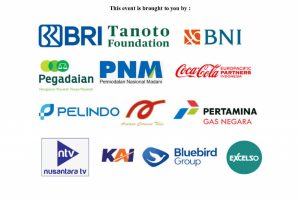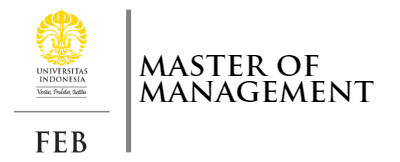Tuesday, 15 October 2024
GNAM Week Universitas Indonesia 2nd Day, 1st session
Tazkia & Gadis
The first session started at 9:30 AM at PT Permodalan Nasional Madani (PNM) in Jakarta, featuring opening remarks from Dr. Arviansyah, the Vice Director of the MM & MBA Program at MM UI, and Dr. Triza Mudita as the moderator. The speaker was Mr. Sunar Basuki, the Director of Operations at PNM. Mr. Basuki explained that the business structure in Indonesia is divided into four categories: Large Enterprises (5,550 units with assets above Rp 500 billion and revenue over Rp 50 billion), Medium Enterprises (60,702 units with assets between Rp 10 billion and Rp 500 billion, and revenue between Rp 15 billion and Rp 50 billion), Small Enterprises (783,132 units with assets between Rp 50 million and Rp 10 billion, and revenue between Rp 300 million and Rp 15 billion), and Micro Enterprises (635 million units with assets below Rp 50 million and revenue up to Rp 300 million). These definitions are based on Law No. 20/2008.
Indonesia also has Ultra Micro Businesses, a subset of micro-enterprises supported by loan institutions or companies like PNM, which provides financial and development assistance. PNM is a State-Owned Enterprise (SOE) focused on empowering and serving underprivileged women and ultra-micro businesses. Beyond financial support, PNM provides social capital through training, coaching, and mentoring to build resilient and trusted business mindsets. Notably, PNM conducts 60 training events across Indonesia.
MSMEs (Micro, Small, and Medium Enterprises) play a vital role in the national economy, accounting for 97% of the total workforce, contributing 60.34% to the national GDP, 14.17% to exports, and 58.18% to total investments. The government, through PNM and other state-owned enterprises, continues to support these businesses to boost economic growth.
Established in 1999 by the government with funding from the Bank of Indonesia, PNM underwent a business transformation in 2008 by launching the UlaMM product. By 2012, PNM secured funding through the capital market by issuing bonds. In 2015, the Mekaar product was introduced to support underprivileged women. By 2021, PNM had reached 11 million customers, making it the largest group lending company in the world. Looking ahead to 2024, PNM aims to expand its customer base to 15.1 million through digital transformation initiatives.
Launched in 2016, PNM Mekaar quickly became the market leader in community-based lending in Indonesia. Despite a decline during COVID-19 (March–June 2020), by April 2024, PNM is set to become the largest global community-based lender with over 15 million active customers, surpassing Grameen Bank and Badhan Bank.
PNM’s digitalization and UMI Holding ecosystem focus on developing applications like PNM Digi Nasabah, Mekaar Tumbuh, and SENYUM Mobile, which aim to streamline financial services and enhance user experience, enabling customers to access services and even become BRILink agents. Socially, 71.86% of women contribute to decision-making in areas such as finance, health, education, and social needs. PNM Mekaar’s grassroots leadership programs are shaped by local dynamics that empower or limit women’s leadership roles.
PNM’s CSR programs focus on supporting their core business (Mekaar) and aligning with Sustainable Development Goals (SDGs). The Ruang Pintar/Smart Space program provides informal education and literacy support to children in PNM’s business areas, with 129 active spaces across Indonesia. The Madani Upskilling Academy offers reskilling and upskilling opportunities for high school graduates to enhance their job readiness. Additionally, the Madani Entrepreneur Academy is a business competition aimed at fostering entrepreneurship and innovation among high school students in 20 cities, particularly in underdeveloped areas. These programs aim to add social value through education, skill development, and entrepreneurship support.
GNAM Week Universitas Indonesia 2nd Day, 2nd session
Alya -Florean
The second session was held at the PT Bank Rakyat Indonesia (BRI) building and started at 1:15 PM WIB. Moderated by Dr. Jonathan, Ph.D., the main speaker was Mr. Arga M. Nugraha, Chief Digital and Information Officer of PT BRI (Persero) Tbk. The session discussed the topic “Digitizing Ultra Micro: How BRI is Helping Improve Financial Inclusion.” The discussion highlighted BRI’s hybrid business model, which combines physical presence with digital capabilities (phygital) to align with customer journeys.
Mr. Nugraha provided an overview of Indonesia’s vast digital landscape, highlighting the country’s large population of nearly 280 million and its significant digital engagement, with over 353 million connected phones and citizens spending around 8 hours a day online. This environment is crucial to how BRI operates, with 98.3% of transactions being conducted digitally, primarily through mobile banking, ATMs, and their BRILink network of agents. BRILink is a unique feature where BRI transforms customers into partners, enabling them to use BRI’s technology to assist other customers, thus extending the bank’s reach. This approach has allowed BRI to scale efficiently, handling a high volume of transactions through its network of 7,700 outlets and over 111,000 employees.
BRI has also formed an ultra-micro holding company to address the underserved ultra-micro market, which consists of about 45 million customers, many of whom lack access to financial services. This group holding includes subsidiaries focused on financial inclusion, particularly targeting women through group lending models similar to Grameen Bank. By empowering these micro-entrepreneurs, BRI aims to elevate them into more stable businesses, initially providing collateral-free loans and, as their businesses grow, offering more formal financial products with collateral.
Since 2021, BRI has established over 1,000 units that house three key financial services together, serving 15 million borrowers, including 7 million through microloans. This integrated approach has significantly strengthened BRI’s ability to support ultra-micro businesses, helping them scale and achieve financial stability. Mr. Nugraha also outlined BRI’s strategies for addressing ultra-micro businesses’ reliance on traditional banking due to trust issues with digital platforms. To overcome this, BRI employs a hybrid model that combines its extensive physical network of over 1 million agents and 7,700 outlets with digital innovations like super apps and AI-powered services.
BRI has introduced BRISPOT to enhance productivity and efficiency by digitalizing business processes and streamlining operations for better performance. Additionally, BRImo and QLola represent radical innovations aimed at improving customer service, particularly for wholesale customers. BRImo utilizes GenAI to humanize digital services, facilitating better interactions through Sabrina, BRI’s smart chatbot. Sabrina now manages 38.4% of BRI’s total contact center traffic, resulting in significant cost savings of IDR 44.7 billion-equivalent to the work of 509 call agents. Moreover, BRI employs AI to enhance the performance of its sales teams, improving their sales pipelines and customer outreach. The bank is also making significant strides with its BRIapi platform, which fosters digital collaboration and partnerships.
BRI emphasizes that digital transformation is not just about technology but also about the “grey matter”-the human element. For BRI, true digital progress lies in combining cutting-edge technology with the power and expertise of its people.
Questions:
How has BRI’s digital transformation, including the use of AI and automation, impacted employment at the bank? Additionally, how does BRI ensure the security and accuracy of online application processes, especially in verifying necessary documents and mitigating risks associated with digital transactions?
BRI recognizes that successful transformation hinges on building a workforce that not only accepts but thrives in a digitally advanced environment. This requires employees to embody key traits such as continuous learning, customer-centricity, agility, collaboration, and innovation. Transitioning the entire workforce to this mindset is undoubtedly challenging, but BRI understands that it’s a necessary step to achieve long-term success. Rather than relying on hiring external talent to lead digital efforts, BRI is committed to developing its people and cultivating the skills and mindset needed to succeed in the digital age. This approach ensures that employees grow alongside the company, aligning with its evolving digital goals.
BRI’s strategy involves investing in human capital and fostering a culture of innovation, a path they have been on and will continue to pursue in the future. In short, BRI’s digital transformation is not only about leveraging technology but also about equipping its people with the tools, mindset, and skills to embrace and drive that transformation forward. This holistic approach ensures that technology and human capital work hand in hand to secure the bank’s competitive edge in an increasingly digital world.
GNAM Week Universitas Indonesia 2nd Day, 3rd session
The third session started at 15:40 at the Tanoto Foundation, with opening remarks from Dr. Jonathan Marpaung, who served as the moderator. The speaker was Mr. Aryo Oetomo, Deputy Director of Policy Advocacy at APRIL Group. Dr. Marpaung welcomed participants and emphasized the importance of philanthropy in business, especially within the paper industry.
The session opened with an overview of the company. APRIL Group is a leader in sustainable paper production, managing nearly 800,000 hectares for both production and conservation. The company boasts an impressive annual output of approximately 4 million tons of paper. APRIL’s flagship product is PaperOne, which is exported to many countries and holds various certifications. Other products include BoardOne and Silverpack, representing APRIL’s flagship paperboard brand, produced by PT Riau Andalan Paperboard International.
Emphasizing the necessity of digital transformation, Mr. Oetomo discussed its vital role in cost reduction, productivity improvement, and profit enhancement, with technology integrated across all operations, from R&D to logistics. The company adheres to a sustainable forest management policy, ensuring that no natural forests are harmed while actively engaging with local communities and utilizing independent auditors to maintain compliance with sustainability goals. APRIL Group exports a diverse range of paper products, all certified under international standards such as the FSC (Forest Stewardship Council). With a commitment to achieving climate positivity by 2050, the company aims for zero emissions from land use and a transition to renewable energy sources. Additionally, APRIL Group significantly contributes to local economies by creating thousands of jobs and fostering beneficial relationships with surrounding communities.
Questions:
- How do you manage waste in your production processes?
- What specific actions are being taken to achieve zero emissions by 2030?
- What types of certifications do your products hold?
- How do you ensure compliance with sustainability goals?
- What technologies are employed to increase productivity?
- How do you engage with local communities?
- Can you elaborate on the role of independent auditors in your sustainability practices?


